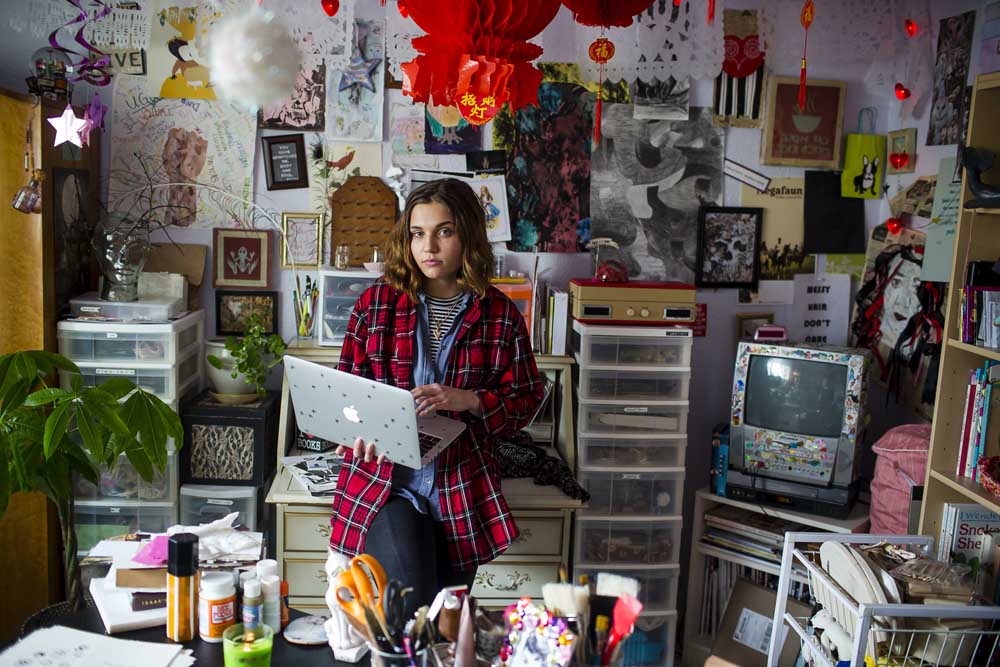YouTube star Paige McKenzie turning to the written word
Published 12:00 am Sunday, March 29, 2015

- Photos by Leah Nash / The New York TimesPaige McKenzie created and stars in the Web series “The Haunting of Sunshine Girl.” McKenzie is extending her brand into print by turning her YouTube show into a series of young adult novels.
“The Haunting of Sunshine Girl: Book One” by Paige McKenzie and Alyssa Sheinmel (Weinstein Publishing, 304 pgs., $16)
Nearly five years ago, a chirpy, animated 16-year-old named Paige McKenzie uploaded a 68-second video to YouTube. “Hey everybody, so, I know this is a little strange,” she says, then confides that her house is haunted and she aims to capture the ghost on camera.
More than 130 million views later, McKenzie’s mockumentary Web series, “The Haunting of Sunshine Girl,” has become a full-time job. Each week, McKenzie spends 80 hours shooting, acting in and editing the show, and frenetically trading messages with viewers.
“Twitter, Facebook, Instagram, Pinterest, Snapchat, Tumblr, Google Plus, YouTube, Meerkat, the occasional smoke signals, you know,” she says when asked how she interacts with her audience. “The interaction is key. I’m accessible. My life is on YouTube.”
Now, there’s a nonvirtual place her fans can find her: bookstores. In an odd inversion of the usual page-to-screen adaptation process, McKenzie is extending her brand into print by turning her YouTube show into a series of young adult novels.
The story follows the same arc as the early Web episodes, as its teenage heroine and narrator, Sunshine Griffith, investigates the mystery behind a spirit haunting her house and tries to rescue her mother from demonic possession.
The first book, “The Haunting of Sunshine Girl,” comes out this week from Weinstein Books, with endorsements from horror heavyweights like R.L. Stine and filmmaker Wes Craven.
“Sunshine Girl,” written with a collaborator, is the latest literary adaptation to emerge from YouTube as publishers and agents trawl the site in a race to land the biggest Web video stars. In the past few months, publishers have released a flurry of reverse engineered titles, including “The Pointless Book,” by Alfie Deyes; “Girl Online,” by Zoe Sugg; and “Grace’s Guide,” by Grace Helbig.
From Web to print
Some publishers are so bullish about leveraging online audiences into print sales that they have created entire imprints dedicated to YouTube, including Awesomeness Ink and Keywords Press, which is releasing nine books this year by Web personalities such Connor Franta, Shane Dawson and Justine Ezarik.
The results have been spotty. “Epic Meal Time,” a cookbook based on a YouTube show with more than 6.7 million subscribers, has sold just 2,192 paperback copies since Gallery Books published it last spring, according to Nielsen, which tracks 85 percent of sales.
“I’m holding my breath,” said Jennifer Bergstrom, vice president and publisher of Gallery Books, which will publish a book by YouTube comedian Miranda Sings this July. “The concept of people watching videos and wanting to buy the book, I question whether that’s going to be a natural progression.”
Strategic marketing
With “The Haunting of Sunshine Girl,” McKenzie and her publisher hope to avoid similar pitfalls. Rather than banking on a social media brush fire to ignite her fan base, Weinstein Books is running parallel marketing campaigns, one aimed at McKenzie’s YouTube audience, the other targeting potential readers who have not heard of her.
Author and publisher have posted a book trailer on McKenzie’s YouTube channel and sent galleys to influential video bloggers, but they are also courting booksellers, librarians and readers of young adult and paranormal fiction. McKenzie sent letters written in the voice of Sunshine to book buyers at Barnes & Noble stores. Weinstein printed 2,000 galleys of the first book and made it available digitally for reviewers on the website Goodreads.
“While she has a tremendous fan base we can market to directly, we didn’t know if the people who love Sunshine and watched her grow up are readers and book buyers,” said Georgina Levitt, the publishing director of Weinstein Books. “We didn’t want people to feel like this was a derivative work of a successful YouTube channel.”
If everything goes according to McKenzie’s carefully drawn blueprint, the book will establish a multimedia franchise. A television show — based on the novel based on the YouTube show — is in production at the Weinstein Co., and McKenzie’s contract locks her in as the star.
Harvey Weinstein, co-chairman of The Weinstein Co., said he is confident the company has a crossover hit, citing strong results from an informal focus group: “I have four daughters, and three of them are into ‘Sunshine Girl,’” Weinstein said, calling the story “Buffy the Vampire Slayer” for a new generation.
No accident
“Sunshine Girl” was never just a teenager messing around with a hand-held camera despite the spontaneous, home video feel of the show.
“None of this was by accident,” said Mercedes Rose, McKenzie’s mother, co-star and business partner. “We always thought the numbers would get so large that Hollywood would have to pay attention.”
The project started in 2010 when a film producer, Nick Hagen, contacted Rose, an actress and voice-over artist, about collaborating on a YouTube show. He chose the haunted house theme partly because the subject proved popular when he did a reverse keyword search to see what people were looking for on YouTube.
“At the time, the No. 2 search subject was ‘ghost,’ and No. 1 was ‘Lil Wayne,’ and you can’t do a whole channel on Lil Wayne,” McKenzie said.
Rose, her daughter and Hagen formed a production company, Coat Tale Productions. They quickly learned some tricks for luring in viewers, like posting warnings on the videos that say “Don’t Watch!” Rumors swirled, helpfully, that the ghostly apparitions were real.
Nearly a year later, the videos passed 5 million views. The show now brings in around $6,000 a month in advertising.
YouTube childhood
McKenzie, who is now 20 and lives outside of Portland, says Sunshine’s character is “99.8 percent” based on her. She spent much of her adolescence in front of the camera. When she was harassed at school, she spoke about it on camera as Sunshine. She griped on the show about her wheat allergy and her frizzy hair.
“I pretty much grew up on YouTube,” she said. “This is my full-time job. This is my life.”
In 2013, literary agent Mollie Glick saw a feature on McKenzie in Seventeen magazine, and asked her if she was interested in writing a novel based on her show. Glick paired McKenzie with a young adult novelist, Alyssa Sheinmel, who wrote three sample chapters and an outline. A book deal quickly followed.
Last spring, Weinstein bought a partial manuscript at auction — in a low-six-figure, two-book deal — and separately optioned screen rights. The company plans to expand the Sunshine series, and recently bought a third book.
“When we saw the enthusiasm building from booksellers, we reached out to the agent to get a third book going,” said David Steinberger, president and chief executive of the Perseus Books Group, which includes Weinstein Books.
As McKenzie prepares to meet many of her fans in the flesh for the first time on an 11-city book tour, she seems comfortable as the face of a new franchise. But she is also careful not to take too much credit. When asked about her writing process, she readily acknowledges that Sheinmel did the bulk of the writing.
“I can’t do this by myself, are you crazy?” McKenzie said. “I’ve never written a book. I don’t know how to do that.”






